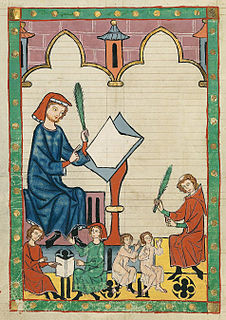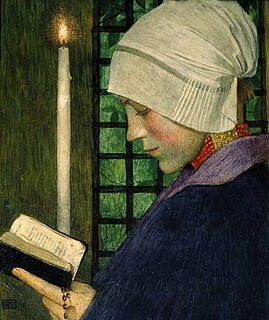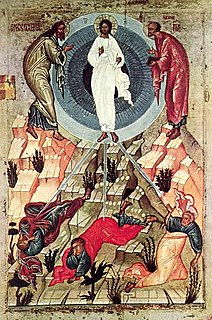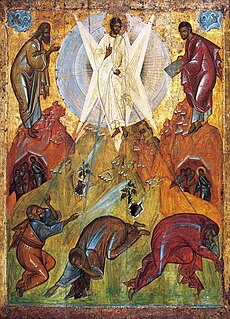
The Jesus Prayer, also known as The Prayer, is a short formulaic prayer esteemed and advocated especially within the Eastern churches: "Lord Jesus Christ, Son of God, have mercy on me, a sinner." The prayer has been widely taught and discussed throughout the history of the Orthodox Church. The ancient and original form did not include the words "a sinner", which were added later. It is often repeated continually as a part of personal ascetic practice, its use being an integral part of the eremitic tradition of prayer known as hesychasm. The prayer is particularly esteemed by the spiritual fathers of this tradition as a method of cleaning and opening up the mind and after this the heart (kardia) and bringing about firstly the Prayer of the Mind or more correctly the Noetic Prayer and after this the Prayer of the Heart. The Prayer of the Heart is considered to be the Unceasing Prayer that the Apostle Paul advocates in the New Testament. Theophan the Recluse regarded the Jesus Prayer stronger than all other prayers by virtue of the power of the Holy Name of Jesus.
An Act of Contrition is a Christian prayer genre that expresses sorrow for sins. It may be used in a liturgical service or be used privately, especially in connection with an examination of conscience. Special formulae for acts of contrition are in use in the Anglican, Catholic, Lutheran, Methodist and Reformed Churches.

A catechism is a summary or exposition of doctrine and serves as a learning introduction to the Sacraments traditionally used in catechesis, or Christian religious teaching of children and adult converts. Catechisms are doctrinal manuals – often in the form of questions followed by answers to be memorised – a format that has been used in non-religious or secular contexts as well. According to Norman DeWitt, the early Christians appropriated this practice from the Epicureans, a school whose founder Epicurus had instructed to keep summaries of the teachings for easy learning. The term catechumen refers to the designated recipient of the catechetical work or instruction. In the Catholic Church, catechumens are those who are preparing to receive the Sacrament of Baptism. Traditionally, they would be placed separately during Holy Mass from those who had been baptized, and would be dismissed from the liturgical assembly before the Profession of Faith and General Intercessions.
Religions with the belief in a future judgment, a resurrection of the dead or a purgatory often offer prayers on behalf of the dead to God.

The following are Roman Catholic prayers to Saint Joseph.

In Christian theology, the beatific vision is the ultimate direct self-communication of God to the individual person. A person possessing the beatific vision reaches, as a member of redeemed humanity in the communion of saints, perfect salvation in its entirety, i.e. heaven. The notion of vision stresses the intellectual component of salvation, though it encompasses the whole of human experience of joy, happiness coming from seeing God finally face to face and not imperfectly through faith..
Absolution is a traditional theological term for the forgiveness imparted by ordained Christian priests and experienced by Christian penitents. It is a universal feature of the historic churches of Christendom, although the theology and the practice of absolution vary between denominations.

Christian meditation is a form of prayer in which a structured attempt is made to become aware of and reflect upon the revelations of God. The word meditation comes from the Latin word meditārī, which has a range of meanings including to reflect on, to study, and to practice. Christian meditation is the process of deliberately focusing on specific thoughts and reflecting on their meaning in the context of the love of God.

The Confiteor is one of the prayers that can be said during the Penitential Act at the beginning of Mass of the Roman Rite in the Catholic Church. It is also said in the Lutheran Church at the beginning of the Divine Service, and by some Anglo-catholic Anglicans before Mass.

Eucharist here refers to Holy Communion or the Body and Blood of Christ, which is consumed during the Catholic Mass or Eucharistic Celebration. "At the Last Supper, on the night he was betrayed, our Savior instituted the Eucharistic sacrifice of his Body and Blood, ... a memorial of his death and resurrection: a sacrament of love, a sign of unity, a bond of charity, a Paschal banquet 'in which Christ is consumed, the mind is filled with grace, and a pledge of future glory is given to us.'" As such, Eucharist is "an action of thanksgiving to God" derived from "the Jewish blessings that proclaim – especially during a meal – God's works: creation, redemption, and sanctification."
In Christian liturgical worship, preces, known in the Anglican prayer book tradition as the suffrages, are short petitions that are said or sung as versicles and responses by the officiant and congregation respectively. It is one of the oldest forms of prayer in Christianity, rooted in the pre-Christian Hebrew prayers of the Psalms used in Temple worship.

Mystical theology is the branch of theology that explains mystical practices and states, as induced by contemplative practices such as contemplative prayer.
Thanksgiving after Communion is a spiritual practice among Christians who believe in the Real Presence of Jesus Christ in the Communion bread, maintaining themselves in prayer for some time to thank God and especially listening in their hearts for guidance from their Divine guest. This practice was and is highly recommended by saints, theologians, and Doctors of the Church.

Divine filiation is the Christian doctrine that Jesus Christ is the only-begotten Son of God by nature, and when Christians are redeemed by Jesus they become sons of God by adoption. This doctrine is held by most Christians, but the phrase "divine filiation" is used primarily by Catholics. This doctrine is also referred to as divine sonship.

Mental prayer is a form of prayer recommended in the Catholic Church whereby one loves God through dialogue, meditating on God's words, and contemplation of Christ's face. It is distinguished from vocal prayers which use set prayers, although mental prayer can proceed by using vocal prayers in order to improve dialogue with God. The practice of mental prayer aligns with that of vocal prayer, as prayer has traditionally been defined as "the raising of one's mind and heart to God."

In the Catholic Church, prayer is "the raising of one's mind and heart to God or the requesting of good things from God." It is an act of the moral virtue of religion, which Catholic theologians identify as a part of the cardinal virtue of justice.
The Roman Catholic Church has often held mortification of the flesh, as a worthy spiritual discipline. The practice is rooted in the Bible: in the asceticism of the Old and New Testament saints, and in its theology, such as the remark by Saint Paul, in his Epistle to the Romans, where he states: "If you live a life of nature, you are marked out for death; if you mortify the ways of nature through the power of the Spirit, you will have life.". It is intimately connected with Christ's complete sacrifice of himself on the Cross: "those who belong to Christ have crucified nature, with all its passions, all its impulses". Christ himself enjoined his disciples to mortify themselves when he said: "If any man would come after me, let him deny himself and take up his cross and follow me". According to the Catechism of the Catholic Church, "[t]he way of perfection passes by way of the Cross. There is no holiness without renunciation and spiritual battle. Spiritual progress entails the ascesis and mortification that gradually lead to living in the peace and joy of the Beatitudes: ‘He who climbs never stops going from beginning to beginning, through beginnings that have no end. He never stops desiring what he already knows.’". The purpose of mortification is to train "the soul to virtuous and holy living". It achieves this through conforming one's passions to reason and faith. According to the Catholic Encyclopedia, internal mortification, such as the struggle against pride and self-love, is essential, but external mortification, such as fasting can also be good if they conform with a spirit of internal mortification.

A number of prayers to Jesus Christ exist within the Roman Catholic tradition. These prayers have diverse origins and forms. Some were attributed to visions of saints, others were handed down by tradition.

Spiritual communion is a Christian practice of desiring union with Jesus Christ in the Eucharist. It is used as a preparation for Mass and by individuals who cannot receive holy communion.

Christian contemplation, from contemplatio, refers to several Christian practices which aim at "looking at", "gazing at", "being aware of" God or the Divine. It includes several practices and theological concepts, and until the sixth century the practice of what is now called mysticism was referred to by the term contemplatio, c.q. theoria.















